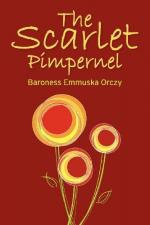IX
But that crumpled and soiled scrap of paper given to him by the woman Leridan still lay in his clenched hand as he strode back rapidly citywards. It seemed to scorch his palm. Even before he had glanced at the contents he knew what they were. That atrocious English doggerel, the signature—a five-petalled flower traced in crimson! How well he knew them!
“We seek him here, we seek him there!”
The most humiliating moments in Chauvelin’s career were associated with that silly rhyme, and now here it was, mocking him even when he knew that his bitter enemy lay fettered and helpless, caught in a trap, out of which there was no escape possible; even though he knew for a positive certainty that the mocking voice which had spoken those rhymes on that far-off day last September would soon be stilled for ever.
No doubt one of that army of abominable English spies had placed this warning outside the Leridans’ door. No doubt they had done that with a view to throwing dust in the eyes of the Public Prosecutor and causing a confusion in his mind with regard to the identity of the prisoner at the Abbaye, all to the advantage of their chief.
The thought that such a confusion might exist, that Fouquier-Tinville might be deluded into doubting the real personality of Paul Mole, brought an icy sweat all down Chauvelin’s spine. He hurried along the interminably long Chemin de Pantin, only paused at the Barriere du Combat in order to interview the Commissary of the Section on the matter of sending men to watch over the Leridans’ house. Then, when he felt satisfied that this would be effectively and quickly done, an unconquerable feeling of restlessness prompted him to hurry round to the lodgings of the Public Prosecutor in the Rue Blanche—just to see him, to speak with him, to make quite sure.
Oh! he must be sure that no doubts, no pusillanimity on the part of any official would be allowed to stand in the way of the consummation of all his most cherished dreams. Papers or no papers, testimony or no testimony, the incarcerated Paul Mole was the Scarlet Pimpernel—of this Chauvelin was as certain as that he was alive. His every sense had testified to it when he stood in the narrow room of the Rue des Cordeliers, face to face—eyes gazing into eyes—with his sworn enemy.
Unluckily, however, he found the Public Prosecutor in a surly and obstinate mood, following on an interview which he had just had with citizen Commissary Cuisinier on the matter of the prisoner Paul Mole.
“His papers are all in order, I tell you,” he said impatiently, in answer to Chauvelin’s insistence. “It is as much as my head is worth to demand a summary execution.”
“But I tell you that, those papers of his are forged,” urged Chauvelin forcefully.




